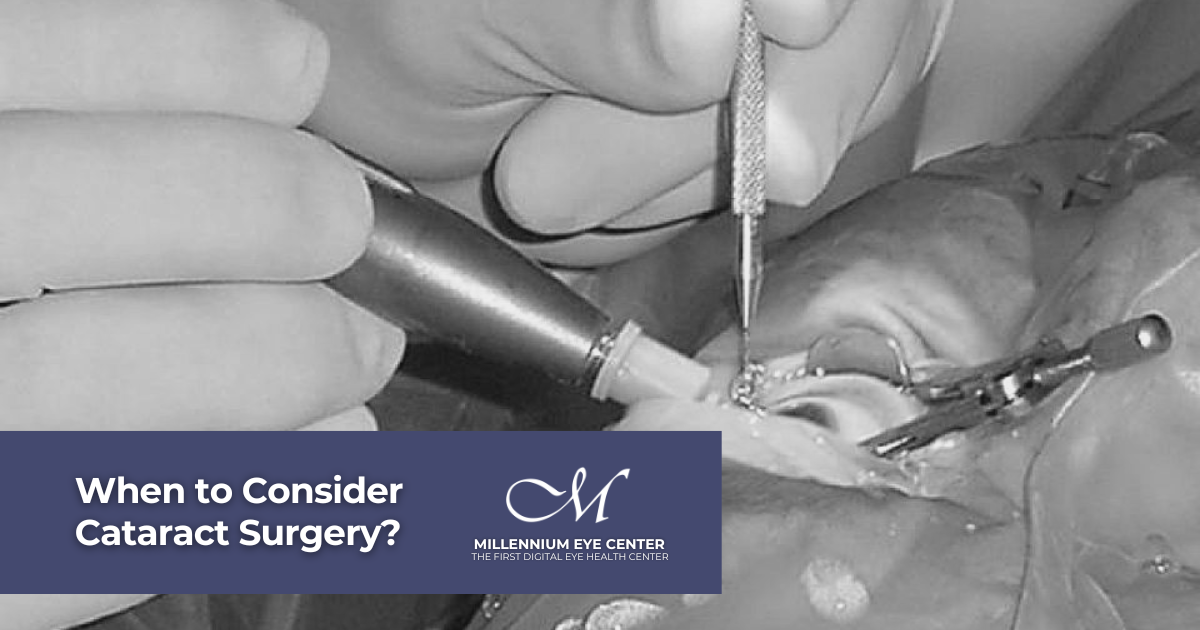As we age, our bodies naturally undergo changes, and our eyes are no exception. One common age-related condition that can significantly impact our vision is cataracts.
At Millennium Eye Center, we believe in an integrative approach to eye care, meaning we consider all aspects of your health and lifestyle when discussing treatment options.
When it comes to cataracts, the question isn’t always if you’ll develop them, but when they might start affecting your quality of life enough to consider surgery.
What is a Cataract, Anyway?
Simply put, a cataract is a clouding of the eye’s natural lens, which is located behind the iris and pupil. This lens works much like a camera lens, focusing light onto the retina to create clear images. When a cataract forms, it scatters the light, leading to blurry vision, faded colors, difficulty with night vision, glare, and sometimes even double vision in one eye.
Our Integrative Approach to Cataracts
Before we even discuss surgery, we explore all avenues of support for your eye health. This includes:
- Nutritional Guidance: Certain vitamins and antioxidants can play a role in slowing cataract progression. We might recommend specific dietary changes or supplements.
- Lifestyle Modifications: Managing underlying health conditions like diabetes, protecting your eyes from UV radiation, and quitting smoking are all crucial steps in maintaining eye health.
- Regular Monitoring: Through comprehensive eye exams, we carefully track the development of your cataracts and assess how they are impacting your vision.
So, When is it Time to Consider Surgery?
While early cataracts may not require immediate intervention, there comes a point when the benefits of surgery outweigh the risks and the inconvenience of impaired vision. Here are some key indicators we consider when discussing cataract surgery with our patients:
- Your Vision Significantly Impacts Daily Activities:
- Are you struggling to read, drive (especially at night), or recognize faces?
- Is your hobby, like knitting or painting, becoming difficult?
- Are you having trouble performing your job safely and effectively?
- If your blurred vision is making everyday tasks challenging and compromising your independence, it’s a strong sign.
- You Experience Increased Glare and Halos:
- Do bright lights, especially headlights at night, cause disabling glare?
- Are you seeing halos around lights, making driving or navigating at night unsafe?
- This is a common and often debilitating symptom of cataracts that can significantly impact your safety.
- Your Glasses Prescription No Longer Helps:
- When new eyeglasses or contact lenses no longer improve your vision to a satisfactory level, it indicates that the cataract is the primary culprit.
- Your Quality of Life is Declining:
- Are you avoiding social situations or activities you once enjoyed because of your vision?
- Are you feeling frustrated, isolated, or depressed due to your impaired sight?
- Cataract surgery isn’t just about restoring vision; it’s about restoring your ability to enjoy life to the fullest.
- Your Eye Doctor Recommends It:
- Based on objective measurements of your vision and the density of your cataract, your eye doctor will provide a professional assessment. Even if you feel your vision is “okay,” there may be benefits to surgery before the cataract becomes too dense, potentially making the procedure more complex.
Dive Deeper: Watch Dr. Lauretta’s Video on Cataracts!
For a more in-depth understanding of cataracts and their stages, we invite you to watch Dr. Lauretta Justin’s informative YouTube video:
What to Expect with Cataract Surgery
Cataract surgery is one of the most common and successful surgical procedures performed worldwide. It involves removing the cloudy natural lens and replacing it with a clear artificial lens called an intraocular lens (IOL). The procedure is typically performed on an outpatient basis and has a high success rate in restoring clear vision.
At Millennium Eye Center, we’ll walk you through every step of the process, from pre-operative assessments to post-operative care, ensuring you feel comfortable and informed. We’ll discuss the various IOL options available to help you achieve your best possible vision, whether that’s clear distance vision, or even reduced reliance on glasses for near and intermediate tasks.
The Millennium Eye Center Difference
We believe in empowering our patients with knowledge and providing personalized care. If you’re experiencing symptoms of cataracts, don’t hesitate to schedule a comprehensive eye exam with us. We’ll carefully evaluate your individual situation, discuss all your options, and help you determine the best time to consider cataract surgery for a clearer, brighter future.
At Millennium Eye Center, your vision and comfort are our top priorities. We’re committed to providing you with the knowledge and care you need to see your best. If you have any questions or would like to schedule a consultation, please don’t hesitate to contact us.
Millennium Eye Center is a leading provider of comprehensive eye care in the Orlando area. Our experienced team of optometrists can help you manage your astigmatism and achieve optimal eye health.
Whether the best choice is glasses, contacts, or other treatment, we understand that the optimal vision correction solution is one that’s tailored to each individual patient. To schedule an appointment with our Eye Expert, Dr. Lauretta Justin, click HERE or text us at 407-292-9812.
Thank you for choosing us as your family’s partners in lifelong vision health. We treasure the trust you place in our practice!
Top image used is a License-free image from Pixabay.
Disclaimer: The content on this blog is not intended to be a substitute for professional medical advice, diagnosis, or treatment. Always seek the advice of qualified health providers with questions you may have regarding medical conditions.

